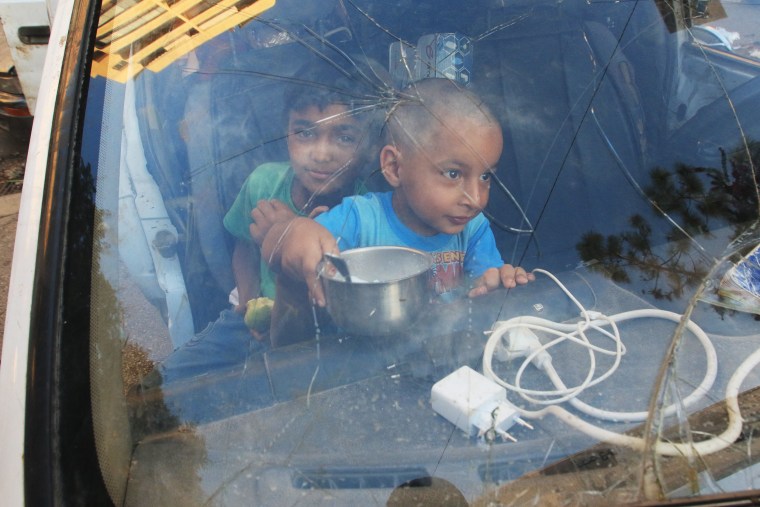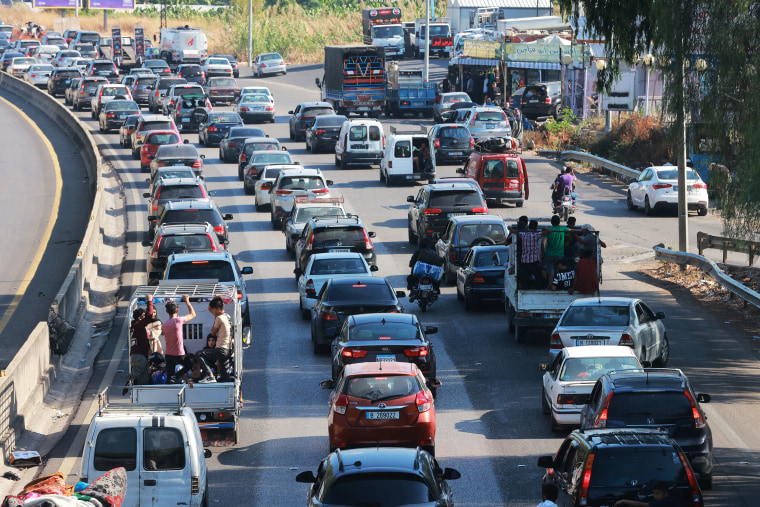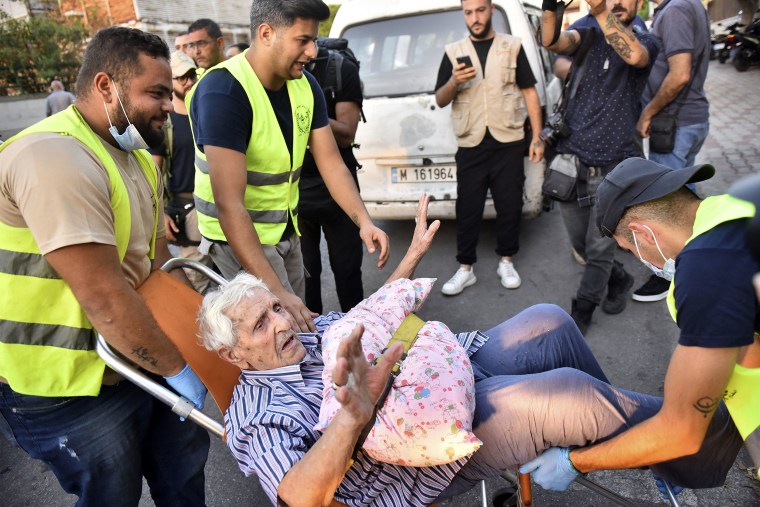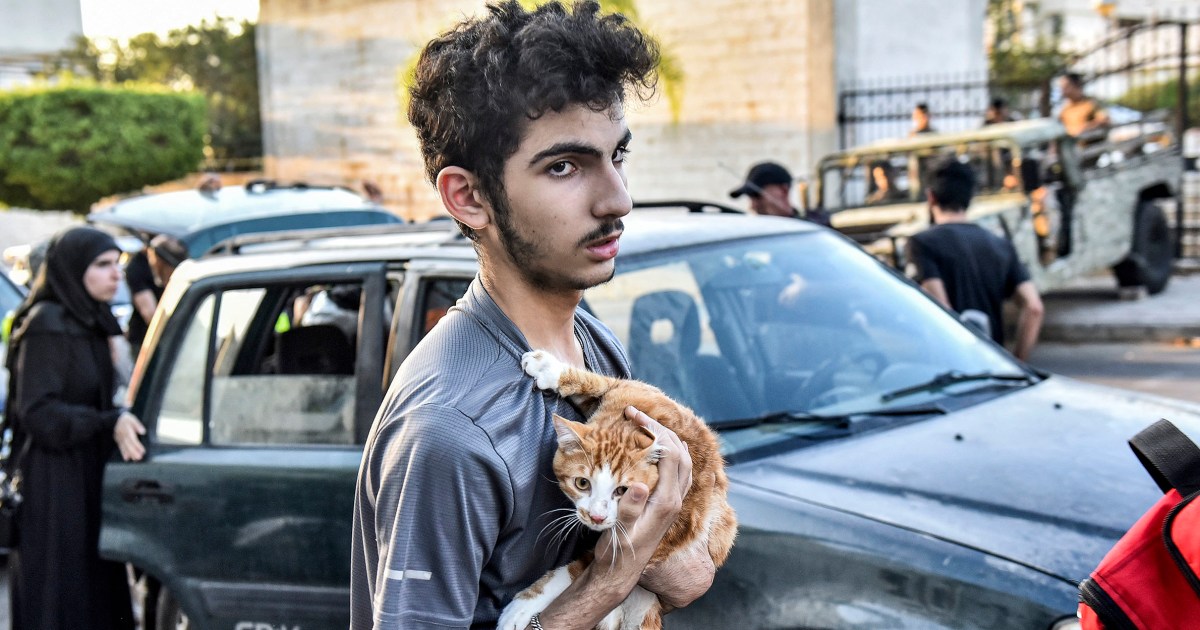Tens of thousands of people fled southern Lebanon as Israel vowed Tuesday to “accelerate” an aerial offensive that already inflicted the country’s deadliest day since war nearly two decades ago.
The Israeli military said it would be operating at “full force” as the death toll in Lebanon rose past 500 people and Hezbollah launched a new barrage of cross-border fire, an intensifying exchange between the U.S. ally and Iran-backed militant group that has stoked mounting fears of an all-out regional conflict.
Washington was preparing to send troops to be ready to help evacuate Americans, while dozens of international flights were canceled.
The sudden escalation saw roads jammed as residents of southern Lebanon abandoned their homes and loaded vehicles with the few possessions they could grab after Israel warned many to leave and followed with a wave of attacks. Tens of thousands of people had fled their homes in the area as of Tuesday, according to the United Nations Refugee Agency.

Nearly 500 people were killed in Lebanon on Monday, according to local health officials, marking the deadliest Israeli bombardment of the country since Israel’s 34-day war with Hezbollah in 2006. By Tuesday, the death toll had risen to at least 558, including at least 50 children and 94 women, with at least 1,835 people injured, according to the Lebanese health ministry.
Israel dramatically expanded its aerial attacks in the wake of its stunning attacks on Hezbollah’s communication devices, which followed nearly a year of mounting hostilities with the group that displaced thousands of people on both sides of the border.
“We struggled a lot on the road just to get here,” said Ali Hassan, who was displaced from Tyre, one of Lebanon’s largest cities, on the Mediterranean coast. “Some of my relatives and my wife’s brothers slept on the streets because they haven’t found shelter yet, and the schools became full now,” he told The Associated Press news agency.


Scenes of families fleeing as fiery explosions filled the skyline fueled global fears of a broader regional conflict.
European Union foreign policy chief Josep Borrell warned that the situation in Lebanon was “extremely dangerous and worrying.”
“I can say that we are almost in a full-fledged war,” he told reporters on Monday, according to Reuters. “If this is not a war situation, I don’t know what you would call it.”
Israel’s bombardment continued into Tuesday, with the Israel Defense Forces saying it had struck dozens of Hezbollah targets overnight and continued to launch attacks as part of what it dubbed “Operation Northern Arrows.”
The IDF said it struck a number of locations it said belonged to Hezbollah in waves of strikes early Tuesday.
It said later Tuesday that it had conducted a targeted strike in Beirut, with more details to follow.
And Israeli military Chief of Staff Herzi Halevi said Tuesday that the army would continue to operate at “full force.”
“We must not give Hezbollah a break,” he said during a morning assessment, according to the IDF. “We will accelerate offensive actions today and strengthen all systems. The situation requires continued intense action on all fronts.”
Meanwhile, the IDF said Hezbollah continued to launch rockets into northern Israel, with the militant group vowing to continue its campaign until Israel ends its offensive in the Gaza Strip.
More than 40,300 people have been killed in the Palestinian enclave, according to local health officials, in Israel’s deadly campaign following Hamas’ Oct. 7 terror attacks, in which Israeli officials said some 1,200 people were killed and around 250 taken hostage, marking a major escalation in a decadeslong conflict.
Israel has vowed to continue its attacks in Lebanon, saying it is necessary to ensure the safe return of Israelis to homes in the country’s north.
But the U.S. does not support its ally’s stated strategy of escalating in order to de-escalate its conflict with Hezbollah, a senior state department official told NBC News on Monday.
“I can’t recall, at least in recent memory, a period in which an escalation or intensification led to a fundamental de-escalation and led to profound stabilization of the situation,” the senior official said.
Secretary of State Antony Blinken is expected to work to find a way to de-escalate the situation during the U.N. General Assembly in New York this week with like-minded partners, including at a dinner with his counterparts from the Group of Seven countries this evening, the official said.
Asked whether the U.S. believed Israel was moving toward a potential ground invasion into Lebanon, the official said it was “important to take Israeli preparation seriously,” and stressed that the U.S. does not believe such a move would reduce violence in the region.

